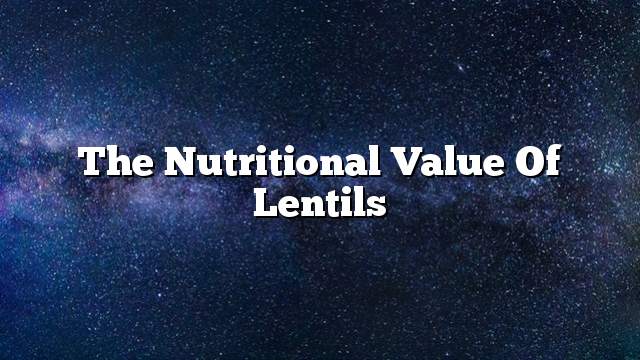Lentils
Lentil is one of the most famous and most useful legumes. It is cultivated in most parts of the world and is cultivated in the Levant, Egypt, Turkey, the United States of America, Iran and several regions of Asia. The red lentils, green lentils, yellow lentils, gray lentils, black lentils, orange lentils, and brown lentils vary slightly among them. The lentil is circular, consisting of two flakes, with a maximum diameter of thirteen millimeters .
Lentils are used in the preparation of many types of food, the most important lentil soup, and used as leaves and husks as organic fertilizer, increasing the soil fertility, and feed dairy cows, to raise milk production.
The nutritional value of lentils
Lentil contains a high nutritional value, made people call it poor meat; it contains insoluble dietary fiber, soluble dietary fiber, high protein proteins, and many mineral elements, especially iron, zinc, selenium, copper, potassium, phosphorus, Vitamin C, vitamin B2, vitamin B6, vitamin C, vitamin E, folic acid, calories, saturated fat, monounsaturated, carbohydrates, vitamins, and some amino acids, such as cysteine and methionine.
Benefits of lentils
- Promotes renal function, maintains its health, and protects against kidney stones.
- Improves gastrointestinal performance and facilitates digestion.
- Prevents injury to constipation, and saves the body from waste and toxins.
- Relieves Irritable Bowel Syndrome.
- Strengthens the body and gives it energy and vitality.
- Regulates body weight, prevents obesity, because it gives a sense of fullness, and prevents eating large amounts of food.
- Regulates the level of sugar in the blood, which reduces the absorption of sugar in the intestine, and prevents its raise.
- Saves the body from harmful cholesterol, and raises the level of good cholesterol.
- Improves cardiovascular health.
- Provides athletes with the energy necessary to carry out their activities.
- Strengthens vision, and keeps the eyes healthy.
- It gives the skin a healthy appearance.
- Accelerates wound healing, and cuts off bleeding.
- Prevents fetal malformations and promotes the health of the pregnant mother and the fetus.
- Raises blood strength, helps produce red blood cells.
- Reduces the risk of stroke.
- Strengthens bones and teeth.
- Strengthens hair, prevents its fall, and protects it from breakage and embrittlement.
- Strengthens nails and prevents breakage.
- Maintains the integrity of the musculoskeletal system, and prevents muscle injury convulsions.
- Strengthens the immune system and prevents the body from infectious diseases.
